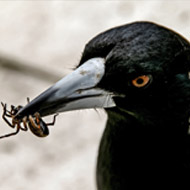Australian magpie ‘dunks’ food before eating

Food dunking is common in a range of bird species but has never been observed in the Austalian magpie before.
The Australian magpie ‘dunks’ its food in water before eating, according to new research.
The action, which appears to be ‘copied’ by its young, could reveal new insights on the dietary systems of some species of bird. Researchers say that it may also show how they respond to prey defences.
While food dunking is common in a range of bird species, it has never been observed in the Australian magpie before. As well as being seen in the adult bird, scientists also observed offspring copying the ‘dunking’ action.
It’s not clear why some birds dunk their food, yet it is believed to be an important process. Some people say that it helps to make the food easier to digest, while others think that it might make unsavoury insects taste less toxic.
The research was led by scientists at the University of York in collaboration with researchers at Western Sydney University.
“Food dunking has been seen in at least 25 bird species, particularly in birds that have high cognitive abilities,” said Eleanor Drinkwater, a PhD student at the University of York’s Department of Biology. “The Australian magpie is an intelligent animal, however we were not expecting to see dunking displayed by this bird”.
In the study, researchers observed a family of magpies at a site near Kosciuszko National Park. They presented one of the adult magpies with a local insect called Mountain Katydid, which is thought to have a bad taste because of the toxins it emits.
The researchers watched as the magpie dragged and beat the insect on the ground. It then carried the insect to a nearby puddle, dunked it into the water, and proceeded to eat it under a nearby bush.
The same magpie then repeated the action with another insect, but this time left the ‘dunked’ insect by the side of the puddle. The team watched as a young bird, that had been watching the adult, pick up the discarded insect and copy the actions of the adult before swallowing it whole.
“Although more research is needed to understand why the bird dunks its food before eating, our initial assumptions are that it responds to the ‘nasty tasting’ chemical defences of the insect, by dunking it in water and making it more palatable,” Eleanor continued.
The study, ‘A novel observation of food dunking in the Australian Magpie Gymnorhina tibicen’ is published in the journal Australian Field Ornithology.



 The Animal and Plant Health Agency (APHA) has updated its online reporting service for dead wild birds.
The Animal and Plant Health Agency (APHA) has updated its online reporting service for dead wild birds.